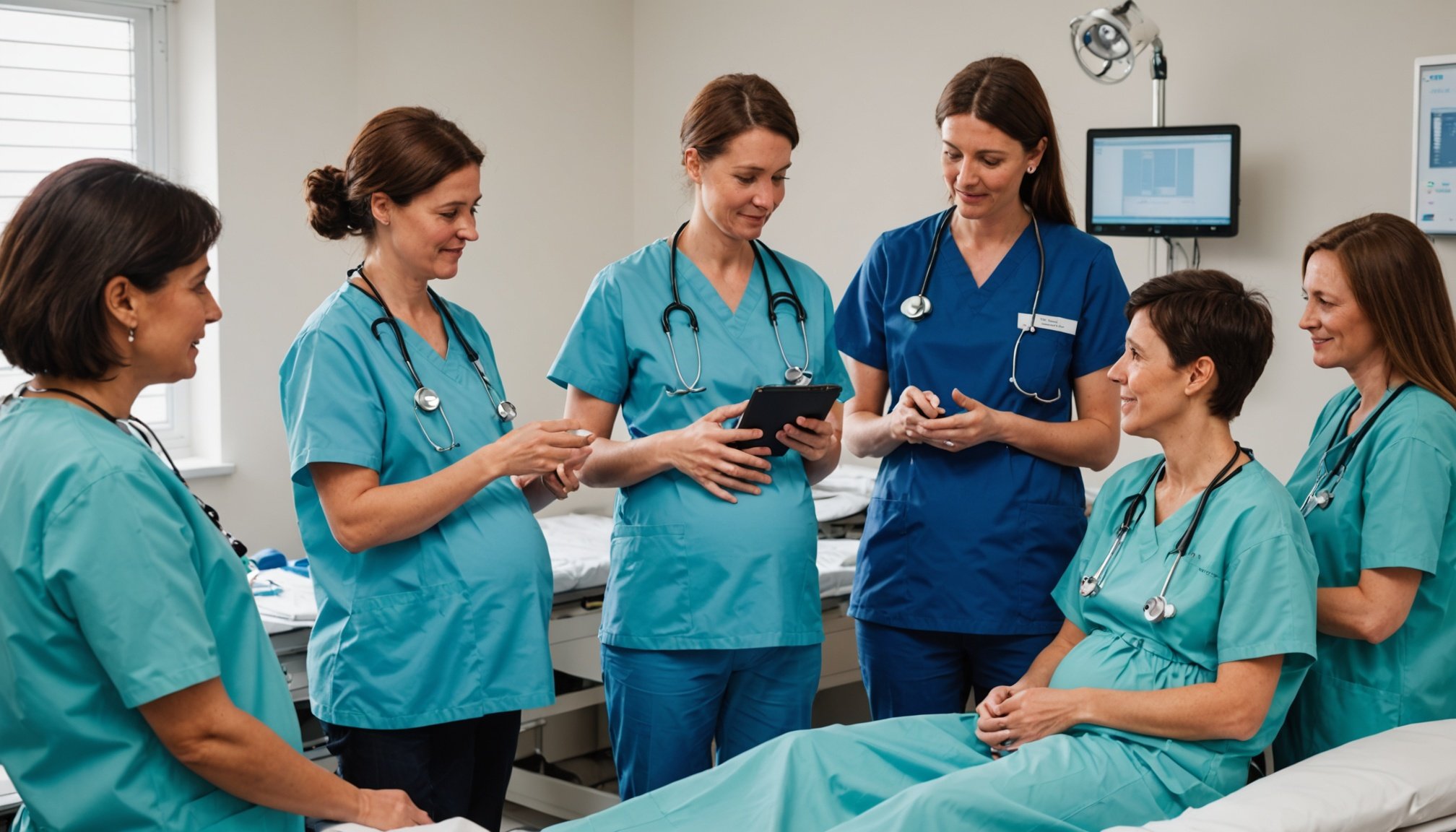Overview of Innovative Technologies in Prenatal Care
In the rapidly evolving landscape of prenatal care innovations across the UK, technology plays an indispensable role in enhancing maternal health outcomes. This transformation is facilitated through advancements in fields like telemedicine and ultrasound technology, which have become cornerstones in modern prenatal services. These technologies extend their reach to expectant mothers, offering remarkable improvements in access, efficiency, and diagnostic capabilities.
Telemedicine stands out as an innovative force, offering remote monitoring and virtual consultations, thus bridging geographical barriers and ensuring continuous care. It allows healthcare providers to connect with patients seamlessly, empowering them with vital information and timely interventions.
Also read : Must-do exercises for expecting moms in the uk to enhance pelvic stability
In addition, cutting-edge ultrasound advancements are revolutionising fetal health monitoring by employing sophisticated imaging techniques that provide clearer, more accurate data than traditional methods. These advancements allow for improved diagnosis and management of prenatal conditions, thus safeguarding fetal wellbeing.
Integrating these technologies not only propels the quality of care but also affirms their significance in the future of prenatal healthcare. The adoption of these tools is crucial in shaping a more inclusive and effective care system for mothers and their babies.
Topic to read : Unveiling recent uk research: the effects of digital media on prenatal development
Advancements in Ultrasound Technology
Recent advancements in ultrasound technology have dramatically reshaped prenatal care by introducing sophisticated imaging techniques. These innovations provide enhanced clarity and accuracy, revolutionising fetal health assessment. Traditional ultrasound methods, while valuable, often lacked the precision offered by newer technologies.
New Imaging Techniques in Ultrasound
The latest imaging techniques in ultrasound focus on delivering high-resolution, three-dimensional images that offer a comprehensive view of the fetus. Such advancements facilitate detailed assessments, crucial for diagnosing complex conditions early in pregnancy.
Impact on Diagnosis and Monitoring
Modern advancements in ultrasound technology have improved diagnostic accuracy, ensuring potential issues are identified promptly. Enhanced monitoring capabilities enable clinicians to make informed decisions about prenatal care, ultimately safeguarding fetal health.
Comparison with Traditional Ultrasound Methods
In comparison to traditional methods, today’s advanced ultrasound technology provides significantly more detailed visualisations. This progress aids in both routine and high-risk pregnancy monitoring, surpassing previous limitations in clarity and diagnostic precision. As these technologies continue to develop, they promise to further enhance prenatal care, delivering benefits to expectant mothers and healthcare professionals alike.
Integration of Wearable Technologies
The integration of wearable devices in prenatal care is revolutionising how maternal health monitoring is conducted. These devices offer continuous, real-time health tracking, which is invaluable for expectant mothers and healthcare providers alike.
Types of Wearable Technologies Used
Various wearable devices are being employed in prenatal care, including smartwatches that monitor heart rate and fitness levels, and specialised pregnancy trackers that focus on fetal movements. These technologies allow for constant, non-invasive observation of vital signs, providing a wealth of data that healthcare providers can use to make informed decisions.
Advantages for Maternal Health
The advantages of wearables in maternal health are significant. Firstly, they empower mothers by offering insights into their health, enabling proactive management of their well-being. Additionally, healthcare providers gain access to continuous data streams that enhance their ability to monitor conditions and respond to changes promptly.
Future Trends in Wearable Technology
The future holds exciting possibilities for wearable technologies. Innovations are likely to focus on improving data accuracy and integration with other healthcare systems, creating a more seamless and effective monitoring experience for both patients and healthcare professionals. The role of wearables in prenatal care looks set to expand significantly.
Case Studies from UK Hospitals
The successful implementation of innovative technologies in UK hospitals highlights the transformative impact on prenatal care services. Several case studies underscore how these advancements have resulted in improved patient outcomes and experiences.
One notable example is the widespread adoption of telemedicine for remote monitoring and virtual consultations. In Birmingham, a pilot programme reduced hospital visits by 30% while maintaining high levels of patient satisfaction through seamless remote check-ups. This facilitated continuous care without geographical constraints, empowering expectant mothers with timely health interventions.
Similarly, the integration of cutting-edge ultrasound advancements at Leeds General Infirmary showcases remarkable improvements in diagnostic capabilities. By employing enhanced imaging techniques, healthcare professionals were able to detect anomalies early, thus allowing for better management of prenatal conditions. As a result, the hospital reported a significant decline in birth-related complications.
Furthermore, the collaboration between healthcare professionals, technology providers, and institutions has been crucial in these successes. Their combined efforts have forged a path for more consistent technological adoption, aligning with the evolving needs of modern prenatal care. Such partnerships serve as inspiring models for hospitals nationwide.
Telemedicine in Prenatal Care
Telemedicine has emerged as a critical innovation in prenatal care, offering a transformative approach to healthcare delivery. In the context of maternal health, it serves by providing both remote monitoring and virtual consultations, which are essential in maintaining continuous, high-quality care for expectant mothers. This technology reduces the need for frequent hospital visits and enables healthcare providers to monitor patients from a distance, ensuring they receive timely interventions.
Implementation of Telemedicine in UK Hospitals
Numerous UK hospitals have successfully implemented telemedicine services, with remarkable outcomes. For instance, pilot programs in various hospitals have demonstrated significant reductions in unnecessary hospital visits. These programs maintain exceptional levels of patient satisfaction, enhancing access to care without geographical limitations.
Benefits to Patients and Healthcare Providers
Both patients and healthcare providers benefit substantially from telemedicine applications. Patients experience convenience and accessibility, receiving medical consultations and monitoring without travel. Healthcare providers can efficiently manage patient loads and prioritise urgent cases, facilitating better health outcomes.
Challenges and Limitations of Telemedicine
Nonetheless, telemedicine faces certain challenges. Issues such as technology access, data security, and patient-physician rapport require careful consideration. Ensuring equitable access to telemedicine remains a priority to maximise its potential in enhancing prenatal care services.
Expert Opinions on Future Directions
In the realm of prenatal care, expert analysis reveals both exciting new capabilities and complex considerations. Healthcare professionals in the UK foresee rapid healthcare innovation, predicting that technologies like AI and Big Data will further evolve maternal and fetal health services.
Interviews with Healthcare Professionals
Feedback from doctors and midwives indicates a strong belief that healthcare innovation will continue to elevate prenatal care. Many see opportunities in the use of AI to analyse massive datasets, potentially predicting complications with greater precision. Experts emphasize how digital solutions will likely integrate more seamlessly into everyday care, becoming critical in diagnosis and monitoring procedures.
Predictions for Future Technologies
Advancements such as AI-driven diagnostics and personalised prenatal plans are generally agreed upon as the way forward. Practitioners predict these technologies to significantly enhance prenatal care evolution. Innovations in areas like genetic screening may also allow for tailored maternal health strategies, improving outcomes across diverse populations.
Ethical Considerations in Prenatal Technology
However, ethical considerations remain a focal point. Experts caution that with increasing data reliance in healthcare, patient consent and privacy must be judiciously managed. Balancing technological benefits with ethical duties is essential to ensure trust and integrity in prenatal technologies.

